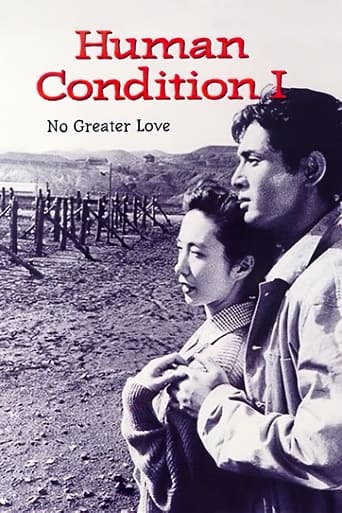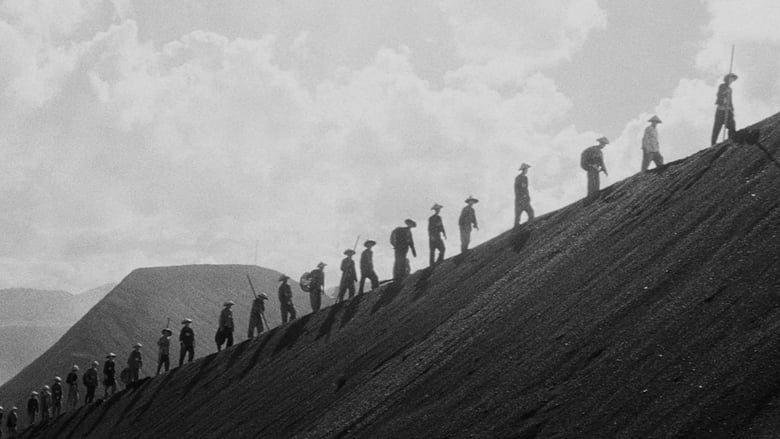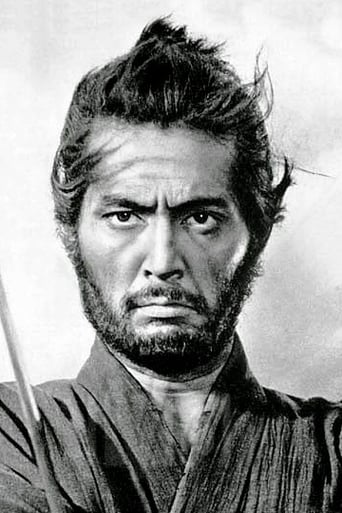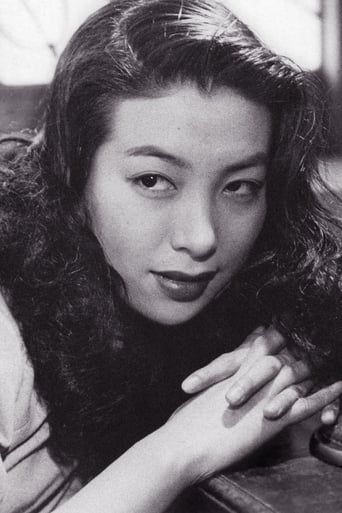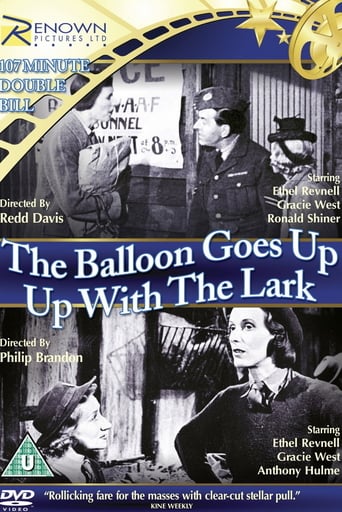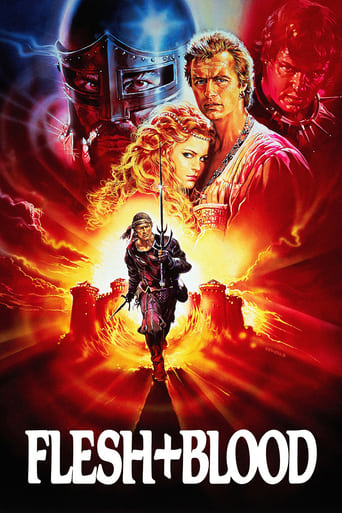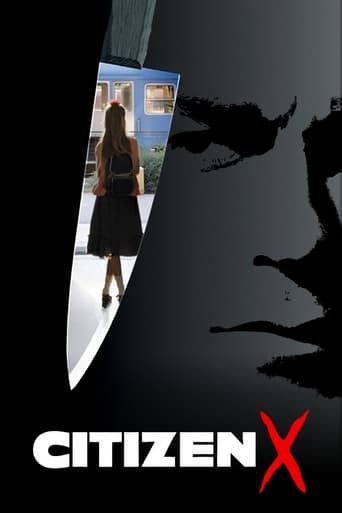The Human Condition I: No Greater Love (1959)
After handing in a report on the treatment of Chinese colonial labor, Kaji is offered the post of labor chief at a large mining operation in Manchuria, which also grants him exemption from military service. He accepts, and moves to Manchuria with his newly-wed wife Michiko, but when he tries to put his ideas of more humane treatment into practice, he finds himself at odds with scheming officials, cruel foremen, and the military police.
Watch Trailer
Free Trial Channels
Cast


Similar titles
Reviews
What a beautiful movie!
Good movie but grossly overrated
Dreadfully Boring
I have absolutely never seen anything like this movie before. You have to see this movie.
The Human Condition (Ningen no jôken) is a 9,5 hour long epic film trilogy directed by Masaki Kobayashi, based on the six volume novel by Junpei Gomikawa. The trilogy stays true to the novel's composition by being divided into six parts, meaning that each of the three installments are split in two parts, in between which are intermissions. Both parts in the first film begin with the same opening credits sequence, showing us some stoneworks portraying dramatic imagery (the similar intro opens all three films). The three movies, each long 3 hours or more, are called No Greater Love, Road to Eternity and A Soldier's Prayer.No Greater Love introduces the main character Kaji, a pacifist during the chaotic mess that was Japan during WW2. To avoid being drafted, he moves to Manchuria with his wife, where he becomes a labor camp supervisor and clashes with the oppressive nature of camp officials and their lower-ranked men.Masaki Kobayashi's films often feature individuals against an oppressive and totalitarian system, be it the feudal Japan in Harakiri and Samurai Rebellion, or WW2 occupied Manchuria in The Human Condition. Kobayashi himself was drafted into the army and sent to Manchuria during the war, meaning that the character of Kaji is not far away from the director himself. Some people accuse the trilogy to be too melodramatic - well, if that's how Kobayashi saw the situation, and he was there, I don't have much of a big problem over it.Kaji is brilliantly portrayed by Tatsuya Nakadai, one of the most versatile Japanese actors. He handles the role fantastically and lives up to the challenge of carrying the entire 9,5-hour plot on his back. Michiyo Aratama, who played Michiko, is perhaps more well-known for her role in Kobayashi's Kwaidan.The Human Condition offers some brilliant widescreen composition and magnificent B&W imagery, as most Kobayashi films do. The film has some problems, though, most of which are of strictly technical nature. First, some of the violent scenes were filmed awkwardly, like the whipping scene listed under IMDb "Goofs". Second, because the entire cast was Japanese, the Mandarin spoken by the miners is very unrealistic (doesn't bother me personally, but it's still there). Third, the mining conditions are surprisingly underplayed and were even harsher in real life. Fourth, the music is sometimes too annoying, loud and even useless in several scenes.But overall, this is definitely a film you have to check out if you're into Japanese cinema, WW2 films, or epic films in general.8,5/10
Hello, my name's Jacob. I'm a 21 year old guy, from Israel, forced to join the army at the age of 18 as nearly all people of my country have to, forced to waste 3 years of my life doing things I'd never want to do if only I was allowed to choose. I'm not a great movie buff. I'm a simple person, and I'd rather play a video game to kill time, but I do like action and war films which is how I got to see "The human condition" on some list here on IMDb. Sounded interesting, and so I decided to watch the 3 films. So this is a review about all 3...The films accurately demonstrates, maybe to the extreme, what it is to be a peace-loving, good human being, in a place where fascism and cruelty reigns supreme. Some people may say that Kaji's character is too unbelievable. Too saint-like, to the point where it becomes frustrating. I say it's not true- It's a movie, not real life. Kaji's behaviour might not be realistic, he faces humanity's worst traits with his own altruist ideals of pacifism and equality, as if he's some sort of WW2 superhero. Saying one cannot identify with him is wrong, however, in my humble opinion, because even if maybe you wouldn't act the way he did when put in the same situations, you can appreciate the way he handled himself, you can admire him and aspire to be like him. He isn't a saint though, he makes mistakes, born out of the cruelty and misery that surrounds him, betraying at times the "code" that he is supposed to protect and follow, but even then, you know that ultimately deep down he's the same person, no matter how things go.Seeing many many irrational things in my military service, I can relate to Kaji in many ways. Seeing people who dedicate their lives to controlling others for the sake of getting promoted, to get appreciated by their superiors who actually appreciate them about as little as they appreciate their own soldiers. People who care for their own interests far more than they care for the interests of those they are in charge of, crushing their wants and needs and deeming them unimportant in the blink of an eye, while their own interests take much higher priority... People who enforce and follow strict rules that are unbending and unreasonable, with such a passion, that it makes you think any reasonable man would dismiss those people as insane, yet still, those are the people who are in charge, because they are the ones who stay in the army and dedicate their lives to it and to it's incredible stupidity, while the real reasonable people go on to dedicate their lives to do something that might actually be beneficial to humanity. This has now officially become somewhat of a rant of how terrible military life and discipline is, maybe more so than it is a review of this series of movies. But why I am saying all of this? because these observations of mine- they are accurately depicted in this movie. If only these real life people that I know were just trying to be a bit better, a bit more human, more like Kaji, maybe my impression of what the army is like wouldn't have been so gloomy as they are now. Kaji, in the films, tries-everywhere he goes-to set things right for those around him, he goes through so many terrible things, scenes that are so... Vile, and so distorted from what you think of human nature as it is in our usually comfortable modern life, and with sheer willpower, he triumphs, even if his triumph is just in him, staying alive while everything else is gone. But ultimately, does it do him any good? If he were to die in the first movie, would that have been better? saved him the suffering of everything he went through later? Well, that is for you to decide. What these films have taught me, is that no matter how it ends, it is important for a person to do what he sees as the right thing to do, and to never lose sight of what the right thing to do is... I'd define a good movie as one that makes you think at the end. It doesn't have to be a cool plot twist at the end that makes you think, it just has to be a movie complex enough but also engaging enough to make you think at the end, because you didn't have time to figure out everything you wanted while you were watching it. At the end of the third movie however, I didn't have to think of anything. I had already absorbed everything. All I wanted was to sleep, and just couldn't. My mind was empty, and I could feel only one thing- awe. And that is why I rate "The human condition" 10/10.I'm terribly sorry if what you just read sounded like a bunch of drivel. Maybe this review is not for you, and maybe the movie is not for you. But regardless, I thank you for reading it to the very end. Have a nice day.
Kobayashi makes very clear his distaste for authoritarian power of any kind (I believe he has an almost exact quote to that fact), and nowhere does he see more problems than with his home country of Japan. However, what astounds me about his movies is that he is very careful to present the issues in so much more than simplistic terms, and though there are "good" guys and "bad" guys, he is a strict realist and makes sure their motivations and viewpoints are fully explained. His movies always surprise and compel me, and now that I'm one third the way through his 9 hour long trilogy, I am remembering why.Say what you want about Harakiri and Samurai Rebellion, the samurai "hero" is no action star and his fights ultimately come from being cornered where diplomacy and critical thinking no longer works. Now, Kobayashi is in the WWII era and there are no samurai defenders of justice to save the day, only a complicated mess of Imperialism, nationalism, and patriotism that one lowly humanist finds himself in constant confrontation with. Getting a job at some ore mines, Kaji hopes to find a productive job that will keep him out of the front lines of the war while doing the best to preserve human life in any way he can. At first arrival (in a noteworthily dusty and windy fashion), he confuses his new bosses and their coworkers by claiming he can increase production by--get this--treating workers well and giving them an incentive to work. These terribly radical ideas that clash so harshly against the typical production cycle of "beat the worker, get work done" is at first met with some success, much to the surprise and elation of the workers, but soon afterward the military appears with a cargo of 500 Chinese POWs to increase labor in the mines, and Kaji finds himself a slave owner of hundreds of desperate, starved, unwilling "special workers." Now no one has any patience with his pleas as he attempts to find a way of treating the new workers fairly, stemming escape attempts, and working the complicated and corrupt politics of so many military, industry, and government men.You know where this is going, but despite the 3hr40min playlength, it goes by rather rapidly. Again, there are no samurai sword dances to bring justice and hope to the "end" of the first part, but nevertheless most viewers should find themselves riveted to the screen as fully fleshed out, realistic characters struggle for power and attention and try to save lives--whether it be other people's lives or their own. This movie was shot in the late 1950s, not too far removed from the actual war, and Kobayashi fearlessly and directly confronts everything he observed wrong with the system during wartime Japan. Historical cultural stresses are recognized too, as the Chinese laborers and Japanese masters are constantly confronted with dehumanization and racism, and even a lone Korean appears as a guy "who is hated by both sides" and, in his own way, becomes a massive wrench thrown into an already crumbling machine. The dialog is also very precise and meaningful, important in a nearly four hour long movie, and there's a surprisingly lot of it considering the landscape its shot in. Which brings me to my final point: this is all set against the backdrop of a mining country-side, and Kobayashi uses the natural Japanese landscape to backdrop an epic humanitarian struggle against a sort of severe and rigid lifelessness. The landscape shots themselves can keep you interested through much of the movie, and Kobayashi's use of widescreen composition would make Sergio Leone's jaw drop (if it didn't actually, it would).Kobayashi's storytelling, also, is rather a little more accessible to Western cultures, too. It's more Kurosawa than Mizoguchi or Ozu. Along with many references to Western influences, the actor who plays Kaji looks more like a Westerner than most of the other characters around him (during the dust storm scene he almost looks like Clark Gable...), and he even gets judged poorly for "so many Western books". I'm not entirely sure that Kobayashi looked to the West and found a much better solution to authoritarianism, but he certainly is not attached to Japanese styles of film-making despite his intimacy and familiarity with the culture (which, by the way, extends beyond even the typical countryman's understanding of his own nation). In this movie many direct references are made to the fact that Kaji does not necessarily fit in, and that his mentality is literally Other than the predominate Japanese culture. What makes it great, though, is that Kaji is no perfect being and the other characters are never simple caricatures. Kaji approaches issues with straight-forward critical thinking, and despite how strong his convictions, surprisingly never falls into idealism. It's rare to see a movie like that from any culture, much less one that's able to sustain it for such a long period of time.We'll see how Kaji survives being on the front lines. Methinks the dialog will continue but the story is going to get a lot more messy.--PolarisDiB
Kobayashi's "The Human Condition" is one of a handful of great anti-war movies. While Japanese film has confronted its own crimes of war more than other cinema, I am only familiar with one other Japanese movie which deals directly with the war & the plight of conscientious objectors: Kurosawa's "No Regrets for Our Youth". Many films deal with the futility of war: "Seven Samurai" & "Yojimbo" come immediately to mind. But "Human Condition" takes on the enormity of war, & the means by which everyone becomes complicit in its total corruption. The hero, though a Conscientious Objector, becomes a colonial occupier, an exploiter of slave labor, an employer of a madam who runs a camp of women & girls impressed into prostitution, & generally runs the gamut of crimes against humanity while trying to maintain his virtue & love's beauty. Parts II & III also explore the brutality of the army toward its own soldiers, & the complete desecration of the ideals of the Russian Revolution & the cruelty of ordinary Chinese villagers."The Human Condition" should be ranked with "Grand Illusion", though what could be as lyrical as the Renoir film? If only this were require viewing in all military academies. If only it were required viewing for all lawmakers & the executive. Is that asking too much?

